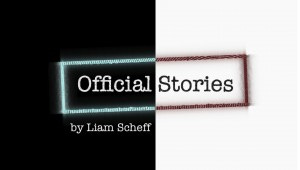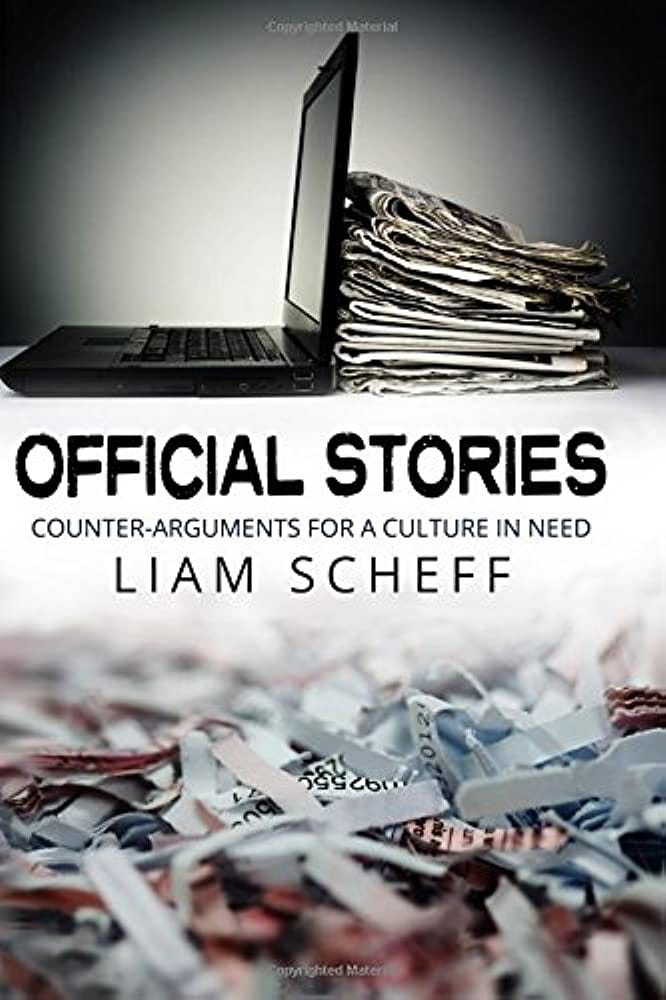[Book review] Official Stories: Counter-Arguments for a Culture in Need, by Liam Scheff
Nearly all knowledge domains are captured and as a result we are still living in the 18th century while thinking that we are modern
I. Introduction
During my doctoral studies, I did three deep dives, spending months or even years reading everything I could find about:
1.) autism (history, prevalence, causes, and costs);
2.) evidence based-medicine; and
3.) genetics.
Many of you have read my 100,000-word findings on the causes and costs of autism. But I also wrote 25,000 words on both evidence-based medicine and genetics that I have never published (perhaps I will do that at some point in the future on my Substack). In every case, the official story fell apart fairly quickly. I discovered that:
1.) The causes of autism are pretty straightforward and the costs are astronomical.
2.) In spite of noble intentions, evidence-based medicine has been hijacked by the pharmaceutical industry and is not evidence-based nor medicine anymore.
3.) Almost nothing about the field of genetics resembles the official narrative about how “genes” work.
In every case, within a few hours of honest, open-minded inquiry, the reality of what is known in the field completely contradicted the official statements from government, academics, and the media about that same field.
This is a bewildering experience that leaves one questioning everything (and fearing deep dives into other subjects lest one’s entire worldview unravel).
II. Official Stories: Counter-Arguments for a Culture in Need
I’m a huge fan of a Substack from Australia called Lies are Unbekoming. About a month ago, Lies are Unbekoming published chapter 9 from Official Stories: Counter-Arguments for a Culture in Need by Liam Scheff. The anonymous author of the Substack introduced the chapter with these words:
Official Stories is the most important book I have ever read. Liam Scheff is the best mind I have ever come across….
The breadth and depth of his understanding and investigative work is quite frankly breathtaking….
Each one of the 11 chapters of the book are a signpost, pointing to places few even know exist, inviting you to wander and explore off the well-trodden path.
That’s high praise, coming from someone I respect.
So I read the chapter and it argues that the idea of the “Big Bang” came from Georges Lemaître, a Belgian Roman Catholic priest turned mathematician and astronomer. The idea is relatively recent, first published in the early 1930s and initially met with great skepticism. Scheff then makes a compelling case that support for the Big Bang rests on many assumptions and leaps of faith and that there are other theories that are a better fit for the known data.
Intrigued, I bought the book and I read the whole thing in two sittings. It’s self-published so the formatting and fonts are not ideal. But the contents are astonishing. In the book, Scheff, a self-taught savant whose preferred method is to read everything on a subject, does ten deep dives into the literature in connection with:
Official U.S. history
The CIA
The JFK assassination
9/11
Vaccination
HIV
Shakespeare
Darwinism
The Big Bang
Geology, specifically plate tectonics
And in every case, the official story falls apart fairly quickly and he makes a compelling case for an alternate theory that is a much better fit for the data.
To give just one example, there is almost no evidence to support the notion that a man named William Shakespeare, a part-time British actor and middling business man, wrote the plays associated with his name. Instead the evidence is overwhelming that they were written by a British nobleman named Edward de Vere and the name William Shakespeare was a play on the family crest that featured a lion brandishing a shaking spear.
Each of the other chapters is similarly jaw dropping and yet also straightforward.
In the movement, our epistemology is that “thou shalt not opine about a topic until one has done a deep dive on the subject.” I have not done a deep dive on most of the subjects covered in the book so I am not able to attest to their validity. On the topic that I do know well, vaccination, Scheff absolutely nails it so that encourages me to read the rest of his sources in connection with these additional subjects. I should add that the chapters on U.S. history, the CIA, and the JFK assassination are also consistent with readings I’ve done on those topics. Lies are Unbekoming has done seven articles on Liam Scheff and they are all worth reading — the one on vaccination is brilliant and contains a 5 minute video of Scheff making his case:
Even while I try to remain agnostic on many of these topics, the overall thesis of the book deeply resonates with me and it goes something like this:
We think that we are modern but we are not. We are still living in the 18th century. And the reason is capture. Nearly all fields of knowledge are captured. Certain narratives — myths that we tell ourselves about how the universe works — are very profitable and they order the power relationships in society. As Scheff writes, “Official stories exist to protect officials.” These stories are not true in any objective sense and anyone with a library card and/or a decent internet connection and a few hours to spend, can figure this out if they are willing. But most are not willing because they would rather live inside the walls that are familiar, even though they are confining. Most of what we consider true is not, rather these are the myths and rituals that support our tribe, same as it ever was (in that sense, perhaps we are not even living in the 18th century, but rather, in more primitive times).
In that sense, Official Stories is almost the opposite of Thomas Kuhn’s Structure of Scientific Revolution. Whereas Kuhn creates the illusion that science evolves through four repeating stages (pre-science, normal science, crisis, and revolution), Scheff shows us the grinding of gears and the ways that the machinery of science and society become stuck in primitive notions for centuries or millennia.
Even as he unravels the ideas that are the foundation of our society, there is nothing nihilistic about Scheff’s work. He is not throwing his hands up in the air and claiming that the truth cannot be known (as the postmodernists do). Rather, he is dismantling the official stories, and all of the power relationships that go along with them, in order to create space for new and better narratives to emerge. In the final chapter he pulls it all together and in the space of six pages builds a new metaphysics, ontology, and epistemology to guide our understanding of the world going forward.
I won’t reveal the ending other than to say that I would rather live in Scheff’s cosmology than in the nihilistic nonsense that we’ve been taught for our whole lives about how the universe works. Scheff’s alternative explanation very well might change your relationship with air, water, earth, other people, yourself, and the divine.
I’m terrified to publish this review because even though I already live in exile I’m worried that I will be further branded as a kook for associating myself with so many heretical ideas. But that’s how narratives work, that’s what gives them their power. Official narratives demarcate our lives — you are permitted to think this and not that — and anyone who crosses that thick line will be banished from “polite” society.
Yet we are living in a time when nearly all bourgeois institutions across the developed world have failed catastrophically in response to the pandemic — to the point where they are caught telling bald-faced lies every day and many are engaged in stochastic genocide. It seems well-nigh time to unravel all of the lies and emerge from the dark cave of the 18th century into the better world our hearts intuitively know is possible.
I have to end on a strange note. Liam Scheff’s partner, Helen Kreisler, a fellow truth seeker, died suddenly of a brain aneurysm at age 42 in 2010. Scheff died seven years later, at age 45, after suffering from severe tinnitus. He left a final blog post that is heartbreaking and beautiful. I’m aware of the fact that his death was ruled a suicide, but the tinnitus clearly drove him over the edge. I do not know what to make of his passing (others, including Celia Farber who knew him, will have more details that might shed light on what happened). At a minimum, it suggests that the life of an unconventional truth teller is arduous and often short. But given the recent revelations about Havana Syndrome, whose symptoms include brain aneurysms and debilitating tinnitus, I cannot help but wonder if Scheff perhaps told one truth too many for the powers that be? That’s the other way that official stories work, when social pressures fail to contain the truth, sometimes more heavy-handed methods are utilized by those who have the most to lose. Or maybe not, we’ll likely never know.
In any event, our movement stands on the shoulders of giants — Jeff Bradstreet, Toni Bark, Brandy Vaughan, Helen Kreisler, Liam Scheff, and so many others who have gone before. In my mind, these people are modern day saints. If we are going to fight this battle on the spiritual plane, I think we should call upon the wisdom of our elders, whether literally or figuratively, that they might guide us in the fight in the weeks, months, and years ahead.
Reading Official Stories, I felt set free. It’s not just allopathic medicine that is captured. Nearly all knowledge domains are captured, because that’s how power works. Once we break through the official stories, deeper and more abundant ways of knowing await us on the other side.
Blessings to the warriors. 🙌
Prayers for everyone fighting to stop the iatrogenocide. 🙏
Huzzah for everyone building the alternative society our hearts know is possible. ✊
In the comments, please let me know what’s on your mind.
As always, I welcome any corrections.






Liam Scheff is also hilarious in everything that he writes. Fast on his feet, irreverent, with a keen eye for irony and hypocrisy. At first I found it annoying -- thinking to myself, 'this is serious business!' But over the course of the book he won me over. He's so smart, he cannot help but make fun of the absurdity of the whole situation.
Wow, just wow! Thank you Toby for giving Liam airtime. You're a good man.